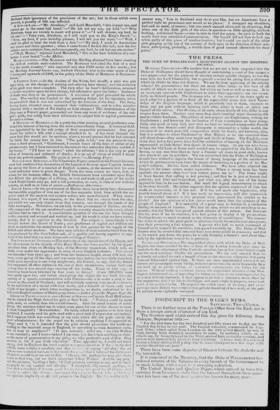THE PRESS.
THE DUKE OP WELLINGTON'S INDICTMENT AGAINST THE MORNING JOURNAL.
MORNING CHRONICLE—We confess that we are not a little surprised that the Duke of Wellington should have thought of entertaining a court of law against
newspaper—nut for the purpose of meeting certain specific charges, as was the case with the Lord Chancellor, but to punish a writer fur giving 17iin a character which he thinks he does not deserve. We are far trout approving of the articles selected for prosecution ; but there are many other things in this best of all worlds of which we do not approve, but widen we bear as well as we can. It is an inveterate custom with Englishmen to abuse their opponents: we are essen-
tially an ill-bred people. The draymcn who at the corner of the street apply to each other for a quarter of an hour all the reproachful terms that their 'know-
ledge of the English language, which is peculiarly rich in them, suggests to them, and yet part without injuring each other either in body or mind, are typical of the nation. Our divines, of all sects, abuse lustily all who diticr in any
respect from them. Doctors very soon drop their breeding when discussing the merits of their brethren. The editors of newspapers are Englishmen, writing for Englishmen ; and knowing the inclination of their countrymen to have every- thing very good or very bad, now that we have no national enemy—the French being our best friends—and that Bonaparte is removed to a better world, the occasion of so much powerful composition while he lived ; and knowing, also, that it is useless to abuse Ferdinand or Don Miguel, as no one concerns him. self about them—they must have angels and devils at home. The English, ever since they had a free press, have had the satisfaction of hearing all the Ministers represented as little better than fiends in human shape. As any one who loves to hear the Old Lady at Rome well scolded may be gratified by the Rev. Edward Irving, so any one who: likes to hear a Premier set down in good style, knows also where he can be gratified. We are astonished that the Duke of Wellington should have wished to deprive the lovers of strong language of tine satisfactions which his predecessors have been the means of furnishing to a portion of his Ma- jesty's subjects. He has been called dishonest. We have often admired the temper of the lower orders under reproaches. When :a strong term has been applied, the answer often is—"you cannot prove me so." The Duke ought to have known that calling is not proving ; and that he is just as honest and patriotic, and kind and benevolent, and what not, after the use of the terms applied to hitn,'as he was before. But mark the logical inconsistency in which he involves himself. He either supposes that the opinion expressed of him has made an impression, or it has not. If it has not made any impression, why trouble himself about it If it has made an impression, will that impressions be counteracted because a few jurymen have pronounced the articles to be libels ? Are the opinions of a few jurors worth more than the opinions of the people of England ? It is unworthy of a great man to indulge in a vindictive feeling on account of injuries. \Ve had an idea, which we are unwilling to re- nounce, that the Duke was proof against attacks of this nature. But however this be, even if lie be sensitive, it is bad policy to display it by prosecution. Noibing invites so much to attack as the discovery of sensitheness. We remem- ber when at school, the great point in selecting objects for mischievous annoyance, was their possessing; a had temper. A person wino had so much command of himself as to conceal his mentions, was passed carefully by. The Duke of Wel- lington may be assured that men and boys have many points in common ; and that as he cannot put down the press, he is only bringing a hornet's nest about him- self, by the injudicious course he is pursuing.
EDINI;I:ito II °limier u.—The unqualified abuse with which the Duke of Wel- lington has been assailed by two or three of the London .linurnals ever since he undertuok the adjustment of the Catia.lie question, has at last stirred him to single out the most notorious libeller for prosecution. \Ve are unit' amazed that he patiently submitted for such a length of time to the atrocious calumnies that party rancour fulminated against him. If there are men unprincipled enote4 It to en- tertain and promulgate every falsity, however monstrous, tine more frequently they are held up to public .. o.um, as systematic calumniators, the better for the nation. Without ranking ourselves among the unqualified admirers of the %vet- iington Administration, or regarding his Grace, as some of our contemporaries .10, as a man without reproach, it does appear to us that a statesman more tined for the ungracious duties lie has to discharge, and more single in purpose, never took hold of the political helm. Ile respects tine ',lash views of tic Man ; and never perhaps since Britain was a nation was private truckling of less avail, or the pub- lic service more vigilantly surveyed.


















 Previous page
Previous page